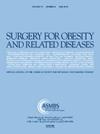Beyond race: social vulnerability and access to metabolic and bariatric surgery
IF 3.5
3区 医学
Q1 SURGERY
引用次数: 0
Abstract
Background
Metabolic and bariatric surgery (MBS) is under-accessed by non-White patients, who are disproportionately affected by obesity. We hypothesized that unique barriers experienced by socially vulnerable patients drive disparate MBS utilization.
Objectives
To determine whether socially vulnerable patients experience greater attrition and face more insurance-mandated medical weight management (MWM) requirements.
Setting
Urban, academic center.
Methods
This retrospective cohort study included adults evaluated for MBS in 2018. Social vulnerability was determined using the 2018 Social Vulnerability Index. Outcomes included attrition, or failure to undergo surgery within 1 year, and the number and duration of MWM requirements. Multivariable logistic regression and negative binomial regression tested these associations.
Results
In 2018, 339 patients were evaluated for MBS (83% female, 70% Black). The attrition rate was 57%. On adjusted analyses, patients in the highest social vulnerability quartile had double the odds of attrition compared to their least vulnerable counterparts (OR 2.33, 95% CI 1.11-4.92, P = .03). Highly vulnerable patients had double the number (IRR 2.29, 95% CI 1.42-3.72, P = .001) and nearly quadruple the duration (IRR 3.90, 95% CI 1.93-7.86, P < .001) of MWM requirements compared to those with low social vulnerability. Odds of attrition increased by 11% and 20% for each additional MWM visit (OR 1.11, 95% CI 1.02-1.20, P = .02) and month (OR 1.20, 95% CI 1.08-1.33, P = .001), respectively.
Conclusions
Patients with high social vulnerability were less likely to undergo MBS and faced more insurance-mandated preoperative requirements, which independently predicted attrition. Insurance-mandated MWM is inequitable and may contribute to disparate care of patients with severe obesity.
超越种族:社会脆弱性与接受代谢和减肥手术的机会
背景非白人患者接受代谢和减肥手术(MBS)的比例偏低,而他们受肥胖症的影响尤为严重。我们假设,社会弱势患者经历的独特障碍导致了不同的 MBS 利用率。目标确定社会弱势患者是否会经历更多的减员,并面临更多保险规定的医疗体重管理(MWM)要求。使用2018年社会脆弱性指数确定社会脆弱性。结果包括自然减员,或 1 年内未能接受手术,以及 MWM 要求的数量和持续时间。多变量逻辑回归和负二项回归测试了这些关联。结果2018年,339名患者接受了MBS评估(83%为女性,70%为黑人)。自然减员率为 57%。经调整分析,社会脆弱性最高的四分位数患者与社会脆弱性最低的四分位数患者相比,减员几率增加了一倍(OR 2.33,95% CI 1.11-4.92,P = .03)。与社会弱势程度低的患者相比,社会弱势程度高的患者所需的 MWM 数量是社会弱势程度低的患者的两倍(IRR 2.29,95% CI 1.42-3.72,P = .001),持续时间几乎是社会弱势程度低的患者的四倍(IRR 3.90,95% CI 1.93-7.86,P <.001)。每增加一次 MWM 访问(OR 1.11,95% CI 1.02-1.20,P = .02)和每增加一个月(OR 1.20,95% CI 1.08-1.33,P = .001),自然减员的几率分别增加 11% 和 20%。保险规定的MWM是不公平的,可能会导致重度肥胖症患者的护理存在差异。
本文章由计算机程序翻译,如有差异,请以英文原文为准。
求助全文
约1分钟内获得全文
求助全文
来源期刊
CiteScore
6.70
自引率
12.90%
发文量
570
审稿时长
56 days
期刊介绍:
Surgery for Obesity and Related Diseases (SOARD), The Official Journal of the American Society for Metabolic and Bariatric Surgery (ASMBS) and the Brazilian Society for Bariatric Surgery, is an international journal devoted to the publication of peer-reviewed manuscripts of the highest quality with objective data regarding techniques for the treatment of severe obesity. Articles document the effects of surgically induced weight loss on obesity physiological, psychiatric and social co-morbidities.

 求助内容:
求助内容: 应助结果提醒方式:
应助结果提醒方式:


